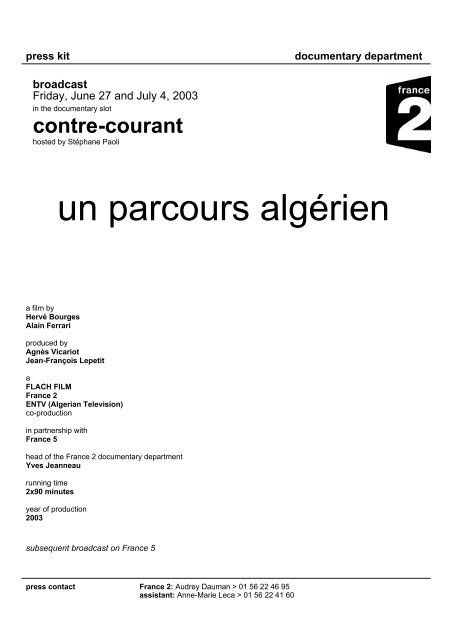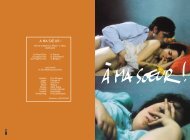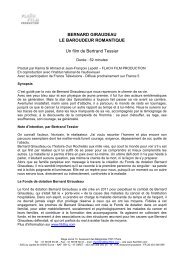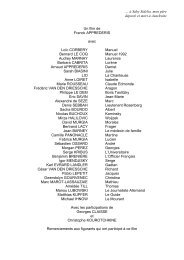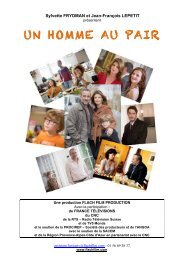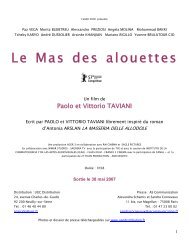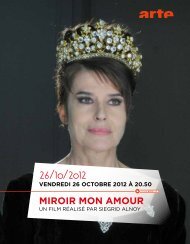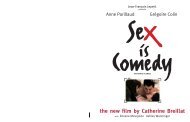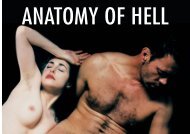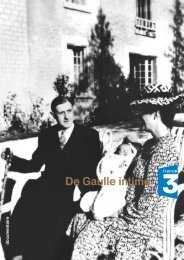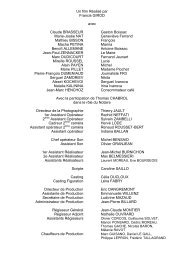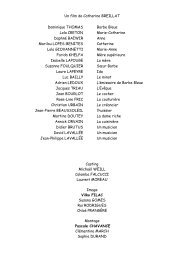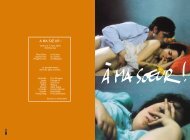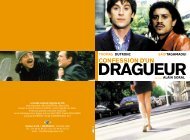Create successful ePaper yourself
Turn your PDF publications into a flip-book with our unique Google optimized e-Paper software.
press kit documentary department<br />
broadcast<br />
Friday, June 27 and July 4, 2003<br />
in the documentary slot<br />
contre-courant<br />
hosted by Stéphane Paoli<br />
a film by<br />
Hervé Bourges<br />
Alain Ferrari<br />
produced by<br />
Agnès Vicariot<br />
Jean-François Lepetit<br />
a<br />
FLACH FILM<br />
France 2<br />
ENTV (Algerian Television)<br />
co-production<br />
in partnership with<br />
France 5<br />
head of the France 2 documentary department<br />
Yves Jeanneau<br />
running time<br />
2x90 minutes<br />
year of production<br />
2003<br />
un parcours algérien<br />
subsequent broadcast on France 5<br />
press contact France 2: Audrey Dauman > 01 56 22 46 95<br />
assistant: Anne-Marie Leca > 01 56 22 41 60
un parcours algérien<br />
interview with Hervé Bourges<br />
and Jean-François Lepetit<br />
- How did this project come about?<br />
- Jean-François Lepetit: This may surprise you: Un<br />
Parcours algérien was born in Acapulco in the year<br />
2000.<br />
Hervé Bourges had been invited by Daniel Toscan du<br />
Plantier as part of the Unifrance delegation to an event<br />
designed to promote French cinema in Latin America<br />
and in which I played an active part.<br />
I had known Hervé Bourges for a long time, firstly as a<br />
staunch supporter of French cinema. His book, De<br />
Mémoire d’éléphant, had just been published and he<br />
offered me a copy. Everyone knows Hervé Bourges as<br />
the chairman of TV channels, the head of the CSA<br />
and a media figure. But, in his book, I found another<br />
Bourges, an actor in and witness to part of our<br />
collective history…<br />
On the flight home, I devoured his book, notably the<br />
chapters on Algeria.<br />
On landing in Paris, I suggested producing a<br />
documentary on the theme of his "Algerian<br />
experience". He accepted in principle but didn't really<br />
begin to work on the project until one year after he left<br />
the CSA. And we produced the film in 2002.<br />
- Why did you focus on Algeria?<br />
- Hervé Bourges: Circumstances have made me a<br />
privileged witness to half a century of Algerian history.<br />
Like the rest of my generation, I was marked by this<br />
war that never openly stated its name. As soon as I<br />
graduated from the Higher School of Journalism in<br />
Lille, I joined Témoignage Chrétien, a weekly whose<br />
stand against colonial wars had been permanent since<br />
the end of World War Two. Out of loyalty to the values<br />
of those who founded it as a resistance paper during<br />
the War, the newspaper couldn't bear the idea of<br />
seeing the French army as an army "of occupation",<br />
even to hold onto a colonial empire that had been<br />
conquered long before. The commitment of André<br />
Mandouze, the Barrats and Georges Suffert had<br />
already been resolute in relation to Morocco. The<br />
"Algerian troubles" and, notably, the condemnation of<br />
torture were immediately at the heart of our editorial<br />
concerns.<br />
- But you didn't simply cover them as a reporter…<br />
- Hervé Bourges: I was called up, like all the young<br />
French men in my generation, and I did my military<br />
service in Algeria. This allowed me to discover the<br />
reality of Algerian society prior Independence and to<br />
perceive the full scope of the incipient conflict. And so,<br />
for thirty months, from January 1958 to the summer of<br />
1960, I was a private in a light aviation unit in the<br />
army, charged with operational support. My superiors<br />
immediately entrusted me with organizational tasks:<br />
the army theatre and the training of young people in<br />
Aïn Arnat, the town neighbouring the camp. I saw the<br />
contrast between conviction and behaviour, for the<br />
worse but also for the better. Any judgement of this<br />
period and the army's role during it must avoid all<br />
over-simplification. This is why I have always strived to<br />
avoid caricature. Perhaps I haven’t always been<br />
exhaustive, as a perfect historian should be, but I have<br />
related what I saw, the good and bad aspects, on both<br />
sides.<br />
- On your return, you would discover another aspect of<br />
the events…<br />
- Hervé Bourges: On my return, I discovered the<br />
State's action. Summoned to the office of Edmond<br />
Michelet, the Minister for Justice, to deal with<br />
problems linked to Algeria, I found myself at the heart<br />
of a complex power struggle in which the leading lights<br />
of Gaullism, Michel Debré and Pierre Mesmer, stuck to<br />
a hard line in relation to the evolution of General de<br />
Gaulle himself who wanted to bring everyone towards<br />
negotiated solution. There, I discovered a whole range<br />
of remarkable and brave people: Edmond Michelet<br />
himself, Simone Veil, Germaine Tillion, Gisèle Halimi,<br />
but also among the Algerian prisoners, Bachir<br />
Boumaza, for instance, and the five historic leaders<br />
held on the Ile d'Aix before being transferred to<br />
Turquant: Boudiaf, Aït Ahmed, Bitat, Khider and,<br />
above all, Ben Bella. As their "jailer", I would meet<br />
them regularly and acted as their official go-between<br />
with the French government in the person of the<br />
Minister for Justice… It was an incredible opportunity
un parcours algérien<br />
to be able to observe events amidst the key actors,<br />
analysing their moves and helping to bring about a<br />
peaceful solution.<br />
- Would you still have that opportunity following the<br />
Evian agreements? What role would you then play?<br />
- Hervé Bourges: In the summer of 1961, Michel<br />
Debré managed to oust Edmond Michelet from his<br />
government and I returned to Témoignage Chrétien as<br />
chief editor. And so I was a journalist throughout this<br />
period marked in Paris by the actions of the Chief of<br />
Police, Maurice Papon, and, in particular, by the<br />
bloody repression of the Algerian demonstrations.<br />
Subsequently, the Evian agreements led to a period of<br />
total confusion in Algeria, with the last-ditch actions of<br />
the OAS and the revelation of the deep-seated<br />
divergences within the heart of the Algerian nationalist<br />
movement. This confusion led to the gradual<br />
emergence of a better-organized centralizing force,<br />
the FLN, of which Ben Bella took control, relying on<br />
the military force represented by the ALN headed by<br />
Colonel Boumediene. As soon as he was in power in<br />
Algiers, Ben Bella asked me to work with his<br />
government on the process of institutional and political<br />
construction that lay ahead. It was a little crazy of me<br />
to get involved in this but, at the same time, it was<br />
thrilling… And that's how I continued to be a direct and<br />
privileged witness to the first years of the new Algerian<br />
republic.<br />
- What issues did you handle in particular?<br />
- Hervé Bourges: I have always attempted to match<br />
my actions with my convictions and experience: I<br />
handled the training of young people and the<br />
preparation of the first generation of Algerian<br />
journalists by bringing leading French professionals to<br />
Algiers for training courses… As much as possible, I<br />
was one of those who tried to keep up the bridge<br />
between the two shores of the Mediterranean, despite<br />
the violence of the separation. And so I was<br />
nominated director for youth and popular education in<br />
the office of a certain Abdelaziz Bouteflika and also<br />
became an assistant to the Minister for<br />
Communications, Bachir Boumaza, who would later be<br />
the Chairman of the Algerian Senate… But the turn<br />
taken by events, notably after the coup of June 19,<br />
1965, when Boumediene ousted Ben Bella from office,<br />
caused me to leave Algeria in 1967 to return to<br />
France.<br />
- An easy return?<br />
- Hervé Bourges: Of course not! But that's another<br />
story. In any case, I've continued to follow events on<br />
the other side of the Mediterranean with close<br />
attention, even if I returned only rarely until Presidents<br />
Chirac and Bouteflika asked me to chair "Djazaïr, Une<br />
Année de l’Algérie en France", more than 2,000<br />
cultural events throughout France that allow us to pick<br />
up the trail of a conversation that has been interrupted<br />
for far too long! I'm particularly happy to be working in<br />
this way to strengthen the bonds between France and<br />
Algeria, something that I have never ceased doing<br />
since that time!
un parcours algérien<br />
Editorial<br />
Alain Ferrari<br />
I was eager to make Un parcours algérien and I loved<br />
making it for three main reasons.<br />
Firstly, Algeria has held – and continues to hold – an<br />
important place in my personal life. I have always felt<br />
– and still feel - a great deal of admiration and respect<br />
for the people of Algeria, confronted for centuries with<br />
the most tragic situations imaginable. In the 20 th<br />
century, they showed their courage, not only during<br />
their struggle for independence but also during the<br />
bloody 1990s. The people are still standing, despite<br />
the problems of living day to day, despite the<br />
massacres. Each new trip to Algeria confirms the<br />
admiration and respect that I feel.<br />
The shooting of Un parcours algérien served to<br />
strengthen that feeling.<br />
Secondly, the atypical nature of Hervé Bourges's<br />
relationship with Algeria. Cinema and television have<br />
above all shown us French people who opted for one<br />
extreme or another: the "suitcase carriers" or the OAS.<br />
Hervé Bourges never adopted such radical positions.<br />
But his daily work, inspired by generosity and<br />
tolerance, allowed him, with the support of others,<br />
notably that of Christian groups, to maintain contacts<br />
between both shores of the Mediterranean,<br />
maintaining them at all costs both at the height of the<br />
"unnamed war" and during the troubled birth of the<br />
Algerian nation and state.<br />
Finally, this project obliged me to imagine an original<br />
form: two stories knitted together, one subjective –<br />
Hervé Bourges's account of his own experience – and<br />
the other more global and objective – the story of the<br />
period (1958-1965) or rather of certain precise aspects<br />
of the period as told by Hervé Bourges and by direct<br />
witnesses or actors of the events. And so I went to<br />
meet the former students of the youth centre in Aïn<br />
Arnat – a centre founded by Hervé Bourges near Sétif<br />
in 1958. An unforgettable encounter. Since Hervé<br />
Bourges wasn't present, these men were able to<br />
speak openly and with the warmth of memory of the<br />
influence on their individual lives of this "odd soldier".<br />
At the same time, they allowed me to touch the harsh<br />
reality of the colonial experience.<br />
Two intermingled accounts, then, that show the ties<br />
that have been maintained between the two peoples<br />
against all odds. May Un parcours algérien shatter the<br />
over-simplification that endures to this day: in this<br />
story of noise and fury, it wasn't a mater of good guys<br />
against bad guys, or even of good guys against good<br />
guys, bad guys against bad guys. On each side, there<br />
were men of goodwill. And I have tried to pay tribute to<br />
them with this film, without subscribing to the culture of<br />
forgetfulness and with an urgent desire for conciliation,<br />
thanks to my "guide", Hervé Bourges.
un parcours algérien<br />
<strong>synopsis</strong><br />
Episode 1: "Birth of a Nation"<br />
Human histories never coincide with stereotypes or<br />
ulterior simplifications. Each of the characters in this<br />
story has his or her own experience, logic and<br />
coherence. The documentary is born, like the events<br />
that it relates, from the interaction of these strong<br />
individual personalities that Hervé Bourges has met,<br />
accompanied or taken a stand against.<br />
First episode: 1956-1962<br />
Everything begins with Témoignage Chrétien, one of<br />
the courageous newspapers that carried out their task<br />
to serve the truth, even during wartime: the positions<br />
adopted by Denise and Robert Barrat, André<br />
Mandouze, Mauriac… Hervé Bourges writes his first<br />
articles for the paper. Then comes his experience in<br />
the field in Algeria: on the base at Aïn Arnat, Private<br />
Bourges is in charge of training the young men from<br />
the village neighbouring the base. Discovery of the<br />
situation of the people, of the reality of colonial<br />
Algeria, of the growing influence of the FLN too… The<br />
third chapter of this experience of the Algerian War<br />
offers a different vision of it: in the office of Edmond<br />
Michelet, Minister for Justice, Hervé Bourges follows<br />
Algerian affairs, handling the files of the men held in<br />
French prisons. From the most obscure prisoners<br />
awaiting execution, to the most famous figures, with<br />
whom General de Gaulle's government negotiates, the<br />
five historic leaders held at the Santé prison in Paris,<br />
then on the Ile d'Aix and finally in the Château de<br />
Turquant… This third chapter show us the reverse<br />
side of the war maps, seen from within the State.
un parcours algérien<br />
Interviewees episode 1<br />
André MANDOUZE<br />
Chief editor – Témoignage Chrétien<br />
Reda MALEK<br />
Chief editor – underground El Moudjahid<br />
Nelly FORGET<br />
Assistant to Germaine TILLION<br />
for the Social Centres<br />
Gisèle HALIMI<br />
Attorney<br />
Jacques DUQUESNE<br />
Writer - Journalist<br />
Commandant Jean POUGET<br />
Assistant to Colonel Crespin (Aïn Arnat)<br />
Miloud BEGAG<br />
Coordinator at the Sétif social centre<br />
Lakhdar BOUZIDI<br />
Salah ABDELLAOUI<br />
Allaoua BOUZIDI<br />
Mustapha FELLAHI<br />
Allaoua TABET<br />
Former members of the Aïn Arnat youth centre<br />
Meriem Belmihoub ZERDANI<br />
FLN militant<br />
Georges SCRIVAT<br />
Prison warder in Algiers<br />
Pierre MESSMER<br />
Simone VEIL<br />
Maître Mourad OUSSEDIK<br />
Attorney<br />
Maître VERGES<br />
Attorney<br />
Maître Paul BOUCHET<br />
Attorney<br />
Bachir BOUMAZA<br />
Official with the French Federation of the FLN<br />
Ahmed BEN BELLA<br />
Ali HAROUN<br />
Official with the French Federation of the FLN<br />
Bernard STASI<br />
Parliamentary private secretary<br />
to the minister Maurice Herzog
un parcours algérien<br />
<strong>synopsis</strong><br />
Episode 2: "The trials of power"<br />
The second film is a fresco that relates the tumultuous<br />
birth of the Algerian State: everything needs to be<br />
organized: what place remains for the population of<br />
European origin? How can the Evian agreements be<br />
implemented? What fate awaits the Harkis who fought<br />
with the French army? The new Algeria is born in pain<br />
and the wrench of exodus, the unleashing of terrorism,<br />
civil disorganisation… For the nationalists now in<br />
power, after the parenthesis of the "temporary<br />
administration" installed at Le Rocher Noir, it's a<br />
matter of applying the contradictory ideals that have<br />
guided them. The Algerian population discovers the<br />
tensions between its leaders and the country splits<br />
into antagonistic areas of influence. The rivalry is<br />
harsh between Ben Khedda's GPRA, this historical<br />
leaders of the FLN and Boumediene's ALN. Hervé<br />
Bourges witnesses the gradual take-over of power by<br />
Ben Bella who summons him to his side where he will<br />
accompany the first years of the new Algerian state, in<br />
the front row to observe the developments of the first<br />
measures adopted…This allows him to be more than a<br />
mere historian today, but an eyewitness.
un parcours algérien<br />
Interviewees episode 2<br />
Roger ROTH<br />
Deputy and Mayor of Philippeville<br />
Vice-Chairman of the Algerian constituent assembly<br />
Reda MALEK<br />
Negotiator in Evian<br />
Claude CHEYSSON<br />
Director of the Franco-Algerian body managing the<br />
resources of the Saharan subsoil<br />
Pierre MESSMER<br />
Minister for the Armies<br />
Ali HAROUN<br />
Member of the Federal Committee for the French<br />
Foundation of the FLN<br />
Commandant Jean POUGET<br />
Bachir BOUMAZA<br />
Minister under Ben Bella and Boumediene<br />
Lakhdar BOUZIDI<br />
Bernard STASI<br />
Monseigneur Henri TEISSIER<br />
Current Archbishop of Algiers<br />
Georges MORIN<br />
Teacher in Constantine following Independence<br />
René VAUTIER<br />
<strong>Film</strong>maker<br />
Mohamed YAZID<br />
GPRA Minister for Information<br />
Negotiator in Evian<br />
Maître Mourad OUSSEDIK<br />
Attorney<br />
Amar AZZOUZ<br />
Head of a training college<br />
Nouredine NAIT MAZI<br />
Former director of El Moudjaid
un parcours algérien<br />
Hervé Bourges<br />
DIPLOMAS<br />
Graduate of the Higher School for Journalism in Lille<br />
Doctor in Political Science (University of Lille II)<br />
CAREER<br />
1956-1967<br />
Chief editor of Témoignage Chrétien<br />
Representative to Edmond Michelet, Minister for<br />
Justice, Garde des Sceaux<br />
Technical adviser to the President of the Algerian<br />
Republic<br />
Director for Youth and Popular Education<br />
Technical adviser to the Algerian Ministers for Justice<br />
and Information<br />
1967-1976<br />
Senior lecturer at the University of Paris II<br />
Director of the Third World Department of the French<br />
Press and Information Sciences Institute (Paris II)<br />
Founder and director of the International Higher<br />
School for Journalism in Yaoundé (Cameroon)<br />
1976-1980<br />
Director of the Higher School for Journalism in Lille<br />
1980-1981<br />
Spokesman for Mr Amadou Mahtar M’bow, general<br />
director of UNESCO and director of the public<br />
information office of UNESCO<br />
1982-1983<br />
Managing director of Radio France Internationale<br />
1983-1987<br />
Chairman and managing director of TF1<br />
1987-1988<br />
Chairman of Canal Plus Afrique<br />
1988-1990<br />
Vice-chairman and managing director of Radio Monte-<br />
Carlo<br />
Chairman and managing director of Radio Nostalgie<br />
1989-1990<br />
Chairman and managing director of SOFIRAD<br />
1990-1993<br />
Chairman and managing director of the national public<br />
television channels France 2 and France 3<br />
1994<br />
Ambassador, permanent French delegate to UNESCO<br />
(United Nations Education, Science and Culture<br />
Organisation); named plenipotentiary minister by<br />
decree on October 20, 1994<br />
From January 24, 1995, to January 23, 2001 (nonrenewable<br />
six-year term)<br />
Chairman of the Conseil Supérieur de l’Audiovisuel<br />
Since November 2000<br />
Chairman of the Union Internationale de la Presse<br />
francophone (UPF)<br />
OTHER ACTIVITIES<br />
Chairman of the Higher School for Journalism in Lille<br />
PUBLICATIONS<br />
L’Algérie à l’épreuve du pouvoir (preface by Jacques<br />
Berque) – Grasset 1967<br />
La révolte étudiante - Le Seuil 1968<br />
Décoloniser l’information - Cana 1978<br />
Les cinquante Afriques (2 volumes, in collaboration<br />
with C.Wauthier) - Le Seuil 1979<br />
Le village planétaire (in collaboration with Jules Gritti)<br />
– N.E.A. 1986<br />
Une chaîne sur les bras - Le Seuil 1987<br />
Un amour de télévision (in collaboration with Pascal<br />
Josèphe) – Plon 1989<br />
La télévision du public - Flammarion 1993<br />
De mémoire d’éléphant - Grasset 2000<br />
HONOURS<br />
Prix "Pierre Mille", 1982<br />
Military Valour Cross, 1960<br />
Chevalier of the Order of the Légion d’Honneur, 1986<br />
Officer of the Order of the Légion d’Honneur, 1998
un parcours algérien<br />
Alain Ferrari<br />
Former assistant to Robert Bresson (Le Procès de<br />
Jeanne d’Arc), a film historian, screenwriter and<br />
director, Alain Ferrari has made numerous<br />
documentaries for television: portraits of performers,<br />
artists, writers and philosophers (Maria Callas, Gérard<br />
Philipe, Tito Gobbi, Daniel Barenboïm, Jean-Claude<br />
Casadesus, Les 1001 visions de Dali, André Malraux,<br />
Max Jacob, Pierre Benoît, Hannah Arendt, etc…), as<br />
well historical and even politically committed films on<br />
the great struggles of the 20 th century (Les Aventures<br />
de la liberté and Un jour dans la mort de Sarajevo with<br />
Bernard-Henri Lévy, Des hommes libres with Daniel<br />
Rondeau, Le Siècle des intellectuels with Michel<br />
Winock, L’année de toutes les nations, with Jean<br />
Daniel, Tout condamné à mort aura la tête tranchée,<br />
etc..).<br />
He has also made fiction works for television, notably<br />
La Gardienne, Deux filles sur un banc, Je suis à Rio,<br />
ne m’attends pas pour dîner, La Barbe-Bleue,<br />
L’Homme qui ne voulait pas tuer, Parlez après le<br />
signal sonore…<br />
For the big screen, he has co-directed Bosna ! with<br />
Bernard-Henri Lévy and has written and directed<br />
Milice, film noir, a documentary feature on the dark<br />
years of the German Occupation and the persistence<br />
of a certain French fascism.<br />
He has published La Gloire de Pagnol with the Institut<br />
Lumière/Actes Sud. For the same publisher, he is<br />
currently working on a book on French screenwriters<br />
and a biography of Henri Jeanson.<br />
Christian Bosseno has written about him (in "200<br />
téléastes français" published by Ciném’Action) :<br />
"He has chosen television to launch and develop a<br />
personal body of work in both the documentary and<br />
fiction fields. His documentaries are always<br />
intelligently devised and constructed like works of<br />
fiction. His fiction works occasionally refer to everyday<br />
reality, without conforming to the strict trend of image<br />
writing and modern naturalism. For Alain Ferrari, the<br />
imagination and attention of fiction remain a vital<br />
factor."
un parcours algérien<br />
credits<br />
Director<br />
Alain FERRARI<br />
Editor<br />
Didier RANZ<br />
Assistant director<br />
Myriam ELHADAD<br />
Archive research<br />
Christine LOISEAU<br />
Original score<br />
composed and conducted by<br />
Denis BARBIER<br />
Interviews by<br />
Hervé BOURGES<br />
Alain FERRARI<br />
Commentary written and spoken by<br />
Hervé BOURGES<br />
With the friendly participation of<br />
Olivier ZEGNA-RATA<br />
Texts read by<br />
Emmanuelle STOCHL<br />
David GABISON<br />
Photography<br />
Philippe RICOU<br />
Jean NAVARRO<br />
Sound<br />
Bruno STETTMEIER<br />
Jean-Claude PERRIER<br />
Electricians<br />
Jacques VAISSIERE<br />
Bruno ROSSI<br />
Max PONCHELLE<br />
Noël ALLAIRE<br />
Mix<br />
Marc AUTHESSERRE<br />
Assistant editor<br />
Olivier FERRARI


